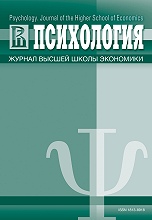Разработка и адаптация методики «Шкала этнонациональных установок»
Аннотация
В статье приводятся результаты апробации новой методики «Шкала этнонациональных установок», направленной наизучение аттитюдов по отношению к феномену «национальности», который в современном российском публичном дискурсе является синонимом этничности. Первое исследование (N = 1444) показало, что методика содержит четыре субшкалы: Националистические установки (неприязненное отношение к представителям иных национальностей), Патриотические установки (ощущение гордости за свою национальную принадлежность и связи с людьми «своей национальности»), Нейтральные этнонациональные установки (безразличное отношение к своей национальной принадлежности) и Негативистские этнонациональные установки (отрицательное отношение к феномену национальности и национальной принадлежности). Субшкалы обладают хорошей внутренней согласованностью, а также конфигурационной и метрической инвариантностью. Три других исследования (N = 156, 533 и 982) продемонстрировали внутреннюю валидность методики. Они показали, что националистические установки положительно связаны с разными формами нетерпимости. Патриотические установки связаны с негативным отношением только к другим этническим группам, а также с позитивным отношением к своей группе. Нейтральные и негативистские этнонациональные установки положительно связаны с различными видами толерантности (этническая, социальная, черта личности) и отношения к другим этническим группам. Таким образом, четыре субшкалы методики измеряют качественно разное отношение к феномену «национальности». Также субшкалы методики группируются в два фактора второго порядка: националистические и «негативистские этнонациональные установки, находящиеся в обратной взаимосвязи образуют фактор, отражающий отношение к другим национальностям и феномену национальности в целом, а патриотические и нейтральные этнонациональные установки отражают национальную идентификацию респондента.
Скачивания
Литература
2. Breugelmans, S. M., & Van de Vijver, F. J. R. (2004). Antecedents and components of majority attitudes toward multiculturalism in the Netherlands. Applied Psychology: An International Review, 53, 400-422.
3. Epikhina, Yu. B., & Chernysh, M. F. (Eds.). (2017). Sotsial'nye faktory mezhetnicheskoi napryazhennosti v Rossii [Social factors of ethnic tension in Russia]. Moscow: FNISTs RAN. (in Russian)
4. Fomicheva, A. E., & Khukhlaev, O. E. (2013). Research on the relationship between preferred coping strategies and ethno-national attitudes. Sotsial'naia Psikhologiia i Obshchestvo [Social Psychology and Society], 4, 58-69. (in Russian)
5. Frenkel-Brunswik, E. (1948). A study of prejudice in children. Human Relations, 1, 295-306.
6. Henry, P. J., & Sears, D. O. (2002). The symbolic racism 2000 scale. Political Psychology, 23, 253-283.
7. Khukhlaev, O. E., Buchek, A. A., Zinurova, R. I., Radina, N. K., Tudupova, T. Ts., & Khakimov, E. R. (2011). Etnonatsional'nye ustanovki i tsennosti sovremennoi molodezhi [Ethno-national attitudes and values of contemporary youth]. Kul'turno-Istoricheskaya Psikhologiya [Cultural-Historical Psychology], 4, 97-106. (in Russian)
8. Kotova, M. V. (2017). Social psychological factors of multicultural adoption policy in Russia: A review. Kul'turno-Istoricheskaya Psikhologiya [Cultural-Historical Psychology], 13(4), 91-100. https://doi.org/10.17759/chp.2017130410 (in Russian)
9. Kuznetsov, I. M. (2016). Variability of patriotism discourses in everyday consciousness of Russians. Vlast' [Power], 7, 164-171. https://doi.org/10.31171/vlast.v24i7.4482 (in Russian)
10. Kuznetsov, I. M., & Khukhlayev, O. E. (2013). Sotsial'no-psikhologicheskiy monitoring riskov mezhnatsional'noy konfliktnosti: metodologiya i praktika. [Social-psychological monitoring of risks of ethnic conflicts: methods and practice]. Sotsial'naya Psikhologiya i Obshchestvo, 1, 104-113. (in Russian)
11. Lebedeva, N. M., & Tatarko, A. N. (2007). Tsennosti kul'tury i razvitie obshchestva [Values of culture and development of society]. Moscow: HSE Publishing House. (in Russian)
12. McConahay, J. B. (1986). Modern racism, ambivalence, and the Modern Racism Scale. In J. F. Dovidio & S. L. Gaertner (Eds.), Prejudice, discrimination, and racism (pp. 91-125).
13. Orlando, FL: Academic Press. Munroe, A., & Pearson, C. (2006). The Munroe Multicultural Attitude Scale Questionnaire a new instrument for multicultural studies. Educational and Psychological Measurement, 66(5), 819-834. https://doi.org/10.1177/0013164405285542
14. Pettigrew, T. F., & Merteens, R. W. (1995). Subtle and blatant prejudice in western Europe. European Journal of Social Psychology, 25, 57-75.
15. Shapiro, V. D., Gerasimova, M. G., Epikhina, Yu. B., & S'yanova, N. B. (2007). Podrostki iyunoshestvo v mnogonatsional'noi Moskve: formirovanie etnicheskogo samosoznaniya i mezhetnicheskikh otnoshenii [Adolescents and youth in multinational Moscow: development of ethnic self-awareness and interethnic relationships]. Moscow: Institute of Sociology of RAS. (in Russian)
16. Soldatova, G. U., & Shaigerova, L. A. (Eds.). (2003). Praktikum po psikhodiagnostike i issledovaniyu tolerantnosti lichnosti [Tutorial in psychodiagnostics and studies of personal tolerance]. Moscow: Moscow University Press. (in Russian)
17. Stephan, W. G., Ybarra, O., & Bachman, G. (1999). Prejudice toward immigrants. Journal of Applied Social Psychology, 29(11), 2221-2237. https://doi.org/10.1111/j.1559-1816.1999.tb00107.x
18. Tishkov, V. (2003). Rekviempo etnosu. Issledovaniyapo sotsial'no-kul'turnoi antropologii [Requiem for ethnos. Studies in social-cultural anthropology]. Moscow: Nauka. (in Russian)
19. Tkachenko, N. V. (2009). Osobennosti vliyaniya etnonatsional'nykh ustanovok na etnicheskie predubezhdeniya v rannem yunosheskom vozraste [Specifics of influence of ethno-national attitudes on ethnic prejudices in early adolescence] (PhD dissertation). Moscow State University of Psychology and Education, Moscow, Russian Federation. (in Russian)
20. Verkuyten, M., & Yogeeswaran, K. (2017). The social psychology of intergroup toleration: A roadmap for theory and research. Personality and Social Psychology Review, 21(1), 72-96.





